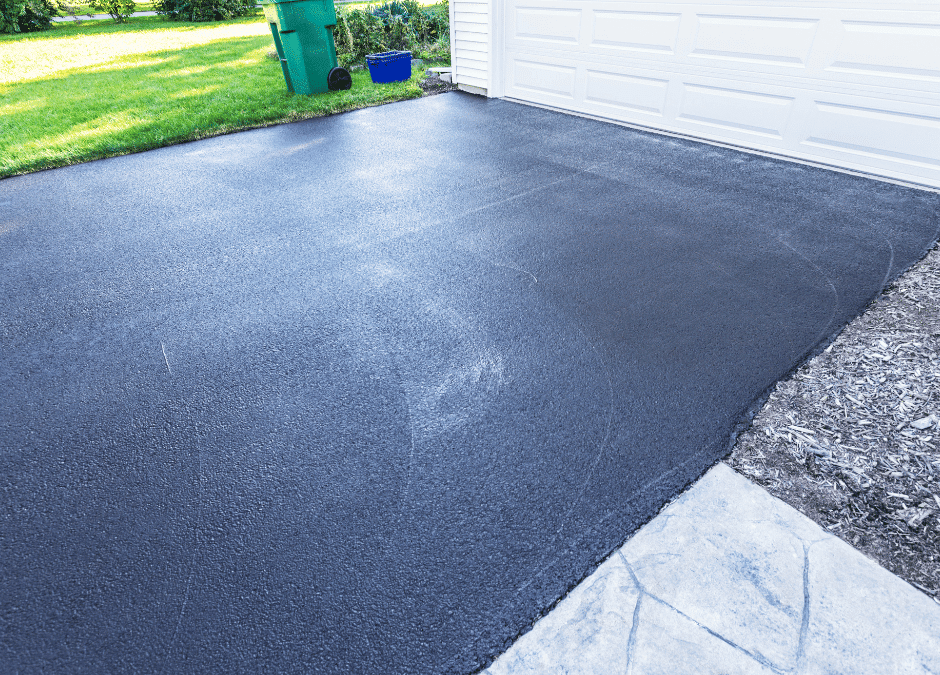Choosing the suitable material for your driveway is crucial in defining its durability, cost, and aesthetic appeal. This guide compares concrete and asphalt driveways to help you understand their pros and cons, enabling you to make an informed decision for your home. Both materials offer unique benefits and challenges, affecting everything from your initial investment to long-term maintenance. Understanding these differences allows you to select the material that best suits your needs, climate, and budget.
Overview of Concrete Driveways
Concrete driveways are favored for their longevity and strength. Typically lasting up to 30 years, these driveways are a robust option for those looking for a long-term solution. The composition of cement, water, and aggregates ensures a hard-wearing surface that resists heavy loads and frequent use. Additionally, concrete’s ability to be colored and patterned allows for aesthetic customization, enhancing the curb appeal of any home. Its rigidity, however, means it may not be the best choice in areas with severe freeze-thaw cycles unless properly treated.
Overview of Asphalt Driveways
Asphalt driveways are renowned for their cost-effectiveness and quick installation time. Made from a mixture of asphalt binder and aggregates, they are designed to flex and adapt to temperature changes, reducing the likelihood of cracking in colder climates. Asphalt’s dark color helps melt snow faster during the winter, providing a practical benefit in snowy regions. However, this material may require more frequent maintenance, such as sealing and resurfacing, to maintain its integrity and appearance. Asphalt is typically smoother than concrete, offering a uniform surface ideal for driveways.
Pros of Concrete Driveways
Concrete driveways are highly durable and require minimal upkeep once installed. Their solid construction prevents common driveway issues like rutting or deformation under heavy vehicle traffic. Concrete’s versatility in finishes—from stamped to polished—allows homeowners to customize the look to match their home’s style. Furthermore, its ability to reflect sunlight can keep the surface cooler, a significant advantage in hot climates. These driveways are also resistant to vehicle fluid stains when sealed correctly, maintaining their pristine appearance for years.
Cons of Concrete Driveways
Despite its many benefits, concrete can be more costly to install compared to asphalt. It may crack over time, especially in areas with extreme winter conditions, requiring periodic repairs that can be expensive and labor-intensive. Concrete is also susceptible to staining from oil, grease, and other chemicals, which can mar its appearance without proper preventative measures. Additionally, the rigidity of concrete means repairs can be more conspicuous, potentially impacting the overall aesthetic of the driveway.
Pros of Asphalt Driveways
Asphalt’s initial lower cost and rapid installation are significant advantages for many homeowners. This flexibility makes asphalt an excellent option for cold weather, as it can better accommodate the expansion and contraction caused by freezing and thawing. Repairing asphalt is generally straightforward, involving simple patching and resealing techniques that can extend its lifespan significantly. Additionally, its smooth, dark surface aids in snow melt, reducing winter maintenance needs. Asphalt driveways can be resurfaced entirely, offering a brand-new appearance without a complete replacement.
Cons of Asphalt Driveways
Asphalt requires more maintenance than concrete, including periodic sealing and the potential need for resurfacing every ten years. Its softer nature makes it less durable under extreme heat, where it can become soft and tacky, potentially deforming under the pressure of vehicle tires. Asphalt also lacks the variety of decorative options available with concrete, limiting customization possibilities. Over time, exposure to UV rays and oxygen can cause the material to dry out and lose its luster, necessitating additional upkeep.
Cost Comparison
While concrete driveways entail a higher initial investment, their longevity and minimal maintenance needs can make them more economical. Asphalt, although cheaper to install, may accrue higher long-term costs due to frequent repairs and maintenance. Homeowners should consider both the short-term and long-term financial implications of each material before making a decision, weighing how each option aligns with their overall property maintenance budget and long-term property plans.
Environmental Considerations
Choosing between asphalt and concrete also involves considering each material’s environmental impact. Asphalt’s production process releases more greenhouse gases, yet it is fully recyclable and often used in paving new roads and driveways. Concrete offers a lower initial environmental impact but lacks the same level of recyclability, often ending up in landfills at the end of its lifecycle. Both materials have pros and cons from an environmental perspective, depending on the specific practices of the suppliers and contractors involved.
Choosing the Right Material for Your Home
The decision between asphalt and concrete should take into account your local climate, budget, maintenance willingness, and aesthetic desires. Consulting with professionals like those at Southside Driveway Repair can provide tailored advice, helping to align your choices with your specific needs and the characteristics of your property. It’s crucial to choose a driveway material that not only looks good but also functions well under local environmental conditions.
Contact Us for Concrete Driveway Solutions
Selecting the right driveway material is a critical decision that affects both the functionality and curb appeal of your home. For professional driveway repair near me, trust Southside Driveway Repair to ensure your concrete or asphalt driveway remains in optimal condition. Whether you need minor fixes or a complete overhaul, our team is dedicated to delivering reliable, long-lasting solutions tailored to your home’s needs.


Recent Comments